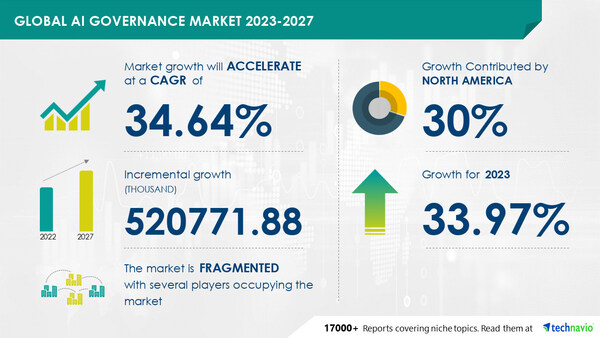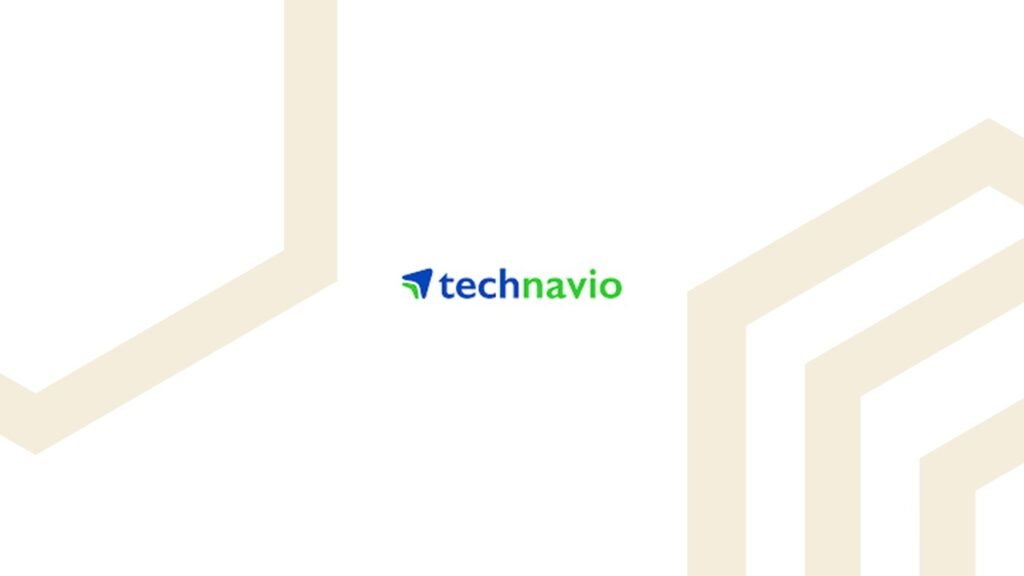NEW YORK, May 10, 2024 /PRNewswire/ — The global ai governance market size is estimated to grow by USD 520771.88 thousand from 2023-2027, according to Technavio. The market is estimated to grow at a CAGR of 34.64% during the forecast period.
For more insights on the forecast market size and historic data (2017 – 2021) – Buy Report

| Forecast period | 2023-2027 |
| Growth momentum & CAGR | Accelerate at a CAGR of 34.64% |
| Market growth 2023-2027 | USD 520771.88 thousand |
| Market structure | Fragmented |
| YoY growth 2022-2023 (%) | 33.97 |
| Regional analysis | North America, Europe, APAC, Middle East and Africa, and South America |
| Performing market contribution | North America at 30% |
| Key countries | US, China, Japan, UK, and Germany |
| Key companies profiled | Alphabet Inc., Amazon.com Inc., Ataccama Corp., Dataiku Inc., DataRobot Inc., Fair Isaac Corp., H2O.ai Inc., Informatica Inc., International Business Machines Corp., Kyndi Inc., Meta Platforms Inc., Microsoft Corp., pymetrics Inc., QlikTech international AB, Salesforce Inc., SAP SE, SAS Institute Inc., SparkCognition Inc., TIBCO Software Inc., and ZestFinance Inc. |
Market Driver
The AI governance market is witnessing a shift towards enhancing audibility and accountability in AI systems. This includes developing methodologies and tools for tracing AI models’ decision-making processes and ensuring algorithmic responsibility. Key areas of focus are limiting biases, errors, and ensuring fairness through testing and transparency. Cloud solutions, machine learning algorithms, deep learning frameworks, and various industries like retail, healthcare, and automotive are impacted. Ethical considerations, such as code of conduct and trending factors, are also crucial. Historical datasets, unstructured data, and next-gen computing architectures are essential for addressing privacy problems, safety risks, and explainable AI. Policies, cost efficiency, and data management capabilities are vital for SMEs and larger sectors like healthcare, IT & telecom, and media & entertainment.
Market Challenges
- The AI governance market faces significant challenges due to the absence of internationally recognized frameworks and standards. Ethical principles for AI use in the private sector, particularly in ML platforms, are crucial for addressing civil liberties concerns and building trust. Fragmented governance approaches can lead to inequities in accountability and transparency, making it challenging for organizations, governments, and regulatory authorities to establish clear policies and enforce compliance. To ensure responsible AI deployment, it’s essential to develop globally accepted ethical principles, address critical tasks involving personal and financial data, and mitigate risks related to reputational, financial, and data-related losses. Building a skilled workforce of AI-trained professionals and implementing robust governance mechanisms are key to addressing ethical considerations and ensuring accountability in the rapidly evolving AI landscape.
Research report provides comprehensive data on impact of trend, driver and challenges – Request a sample report!
Segment Overview
This ai governance market report extensively covers market segmentation by
- End-user
- 1.1 BFSI
- 1.2 Healthcare abd life sciences
- 1.3 Government and defense
- 1.4 Retail
- 1.5 Others
- Component
- 2.1 Solution
- 2.2 Services
- Geography
- 3.1 North America
- 3.2 Europe
- 3.3 APAC
- 3.4 Middle East and Africa
- 3.5 South America
1.1 BFSI- The BFSI industry is increasingly adopting AI technology to enhance operational efficiency and mitigate various risks, such as credit risk, market risk, liquidity risk, and operational risk. AI systems are being integrated into the sector through chatbots and robot advisers, which provide personalized financial advice to customers. Datatron, an MLOps platform, is being utilized by several AI solution providers to streamline the development, deployment, and management of AI/ML models. Google Cloud’s AI technology is being employed to analyze vast amounts of financial data, enabling more accurate risk assessments. Transparency is a crucial ethical principle in AI governance, especially in the BFSI industry, where personal and financial data are involved. AI systems must be transparent in their decision-making processes to build trust with users and adhere to civil liberties. Hurricanes and interconnectedness pose challenges to AI systems, as outdated technologies and infections can lead to virus spread and potential disruptions. AI-based solutions are being developed to address these challenges, with tracking tools and ethical AI principles guiding their development. Research labs and committees are collaborating to establish best practices and ethical principles for the use of AI technology in the BFSI industry. Computing power and critical tasks require ongoing attention to ensure the reliability and accuracy of AI systems. In summary, the BFSI industry’s adoption of AI technology is transforming the sector, with chatbots, robot advisers, and ML platforms playing key roles. Ethical AI principles, transparency, and ongoing research are essential to building trust and ensuring the responsible and ethical application of AI systems in the BFSI industry.
For more information on market segmentation with geographical analysis including forecast (2023-2027) and historic data (2017-2021) – Download a Sample Report
Research Analysis
In the dynamic and complex AI Governance Market, transparency and regulatory compliances are paramount. AI systems, employed in the BFSI industry for credit risk assessment, market risk management, and liquidity risk mitigation, necessitate robust governance mechanisms. These mechanisms ensure alignment with organizational goals, values, and legal obligations. Decision-making processes, driven by AI technologies, must adhere to protocols and methodologies, fostering explainable AI to mitigate algorithmic bias and privacy problems. Safety risks, including those posed by hurricanes or other unforeseen events, necessitate contingency plans and protocols. MLOps, a critical component of AI governance, facilitates efficient and effective deployment and management of AI systems. The market prioritizes AI technologies that offer explainability, fairness, and safety, ensuring trust and confidence in their use.
Market Research Overview
The AI Governance Market is a significant and rapidly expanding sector, driven by the increasing adoption of artificial intelligence (AI) technologies in various industries. Ethical considerations and the need for transparency and accountability in AI systems have led to a growing demand for AI governance solutions. These solutions include ethical frameworks, regulatory compliance tools, and risk management systems. The market for AI governance is expected to grow, driven by the need to address the challenges posed by the use of AI, such as bias, privacy concerns, and security risks. Companies are investing in AI governance to ensure that their AI systems are trustworthy, reliable, and aligned with their values and business objectives. The market for AI governance is a complex and dynamic one, requiring a deep understanding of both the technical and ethical aspects of AI. It is an essential market for organizations seeking to harness the power of AI while mitigating the risks and ensuring ethical and responsible use.
Table of Contents:
1 Executive Summary
2 Market Landscape
3 Market Sizing
4 Historic Market Size
5 Five Forces Analysis
6 Market Segmentation
- End-user
- Government And Defense
- Healthcare Abd Life Sciences
- BFSI
- Retail
- Others
- Component
- Solution
- Services
- Geography
- North America
- Europe
- APAC
- Middle East And Africa
- South America
7 Customer Landscape
8 Geographic Landscape
9 Drivers, Challenges, and Trends
10 Company Landscape
11 Company Analysis
12 Appendix
About Technavio
Technavio is a leading global technology research and advisory company. Their research and analysis focuses on emerging market trends and provides actionable insights to help businesses identify market opportunities and develop effective strategies to optimize their market positions.
With over 500 specialized analysts, Technavio’s report library consists of more than 17,000 reports and counting, covering 800 technologies, spanning across 50 countries. Their client base consists of enterprises of all sizes, including more than 100 Fortune 500 companies. This growing client base relies on Technavio’s comprehensive coverage, extensive research, and actionable market insights to identify opportunities in existing and potential markets and assess their competitive positions within changing market scenarios.
Contacts
Technavio Research
Jesse Maida
Media & Marketing Executive
US: +1 844 364 1100
UK: +44 203 893 3200
Email: media@technavio.com
Website: www.technavio.com/
SOURCE Technavio


